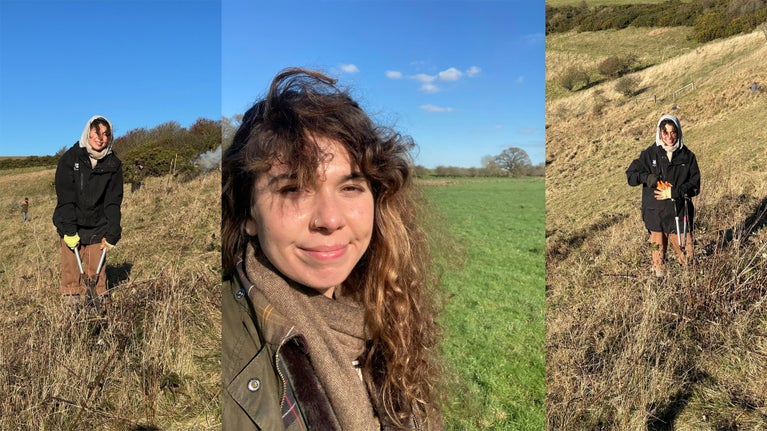
Changing Chalk Blogs
We asked our Community and Participation Apprentice Kitty a few questions about what it is like to be an apprentice with the National Trust, working on the Changing Chalk Project.
Just a short trip from the city, the South Downs offers an incredible opportunity for children to connect with nature, learn about food production, and understand the vital importance of preserving one of the UK's most unique landscapes. We asked Hannah from Brighton & Hove City Council's Farm School project about her work with local schools, and and finding ways of connecting the children that live in the town to the downs on their doorstep.
Brighton and Hove, with its vibrant seaside energy and bustling city life, may seem a world apart from the rolling hills and chalk grass farmlands of the South Downs National Park. Yet just a short trip from the city, the South Downs offer an incredible opportunity for children to connect with nature, learn about food production, and understand the vital importance of preserving one of the UK's most unique landscapes.
The Changing Chalk Farm School project connects local primary schools with local farms and provides a creative way to engage children in meaningful lessons about environmental conservation, sustainable farming, and the preservation of rare chalk grassland. Since the beginning of the project in 2023 over 1,000 primary school children have visited a local farm.
‘The children get a better understanding of where our food comes from. It's wonderful to be on an actual working farm in the local area and talking to a real farmer.’
Bernie, teacher, Carden Primary
Nestled within the hills of the South Downs National Park are the Brighton & Hove City Council tenant farms. For children from the city, Farm School visits offer an enriching escape into the nature on their doorstep.
‘It's easy to presume that children get to go for walks in the countryside however, many don't’
Bernie, teacher, Carden Primary School
Whether through guided farm tours, hands-on activities or nature walks, these experiences invite children to explore the interconnectedness of agriculture, wildlife, and conservation.
One of the most captivating aspects of a visit to the South Downs is the chance to learn about chalk grassland—this unique landscape is home to a diverse range of flora and fauna, many of which are found nowhere else in the UK. Engaging children with the story of chalk grassland conservation helps foster a deep sense of responsibility for the environment and the species that rely on it.
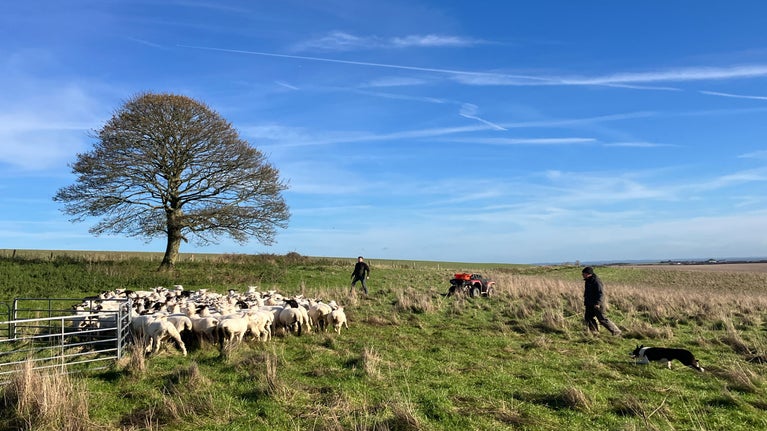
Farm School visits are designed to be interactive, allowing children to learn through doing. Farmers often involve children in tasks such as feeding animals, collecting eggs, or learning more about the planting and harvesting crops.
‘The interactive nature of the experience is invaluable. The hands-on, smells, sounds and physicality of the farm impacts enormously’
Jane, Farmer, Standean Farm
‘I’ve learnt that I love chickens!’
Year 4 boy, Whitehawk Academy
This direct involvement offers children a tangible connection to where their food comes from, dispelling any misconceptions about the journey of food from farm to table. The sight of children pulling up turnips, or feeding lambs, or holding a chicken sparks curiosity and encourages questions about food production, sustainability, and the hard work that goes into running a farm.
We learnt that you have to work every single day, even if it is cold or rainy.
Year 2 child, St Marks C of E School, visiting Truleigh Hill
Through these experiences, children gain a deeper understanding of the seasons, soil health, and the importance of sustainable farming practices. Whether they’re helping to planting wheat seeds or learning about conservation grazing, these activities create lasting memories and develop a respect for the natural world.
‘Many children who struggle in a traditional classroom setting have flourished on the farm, gaining confidence through hands-on tasks. Since getting back there has been a shift in how children think about food, nature, and sustainability—many now understand the effort that goes into growing what’s on their plate and have become more mindful of food waste’
Lily, class teacher Benfield Primary
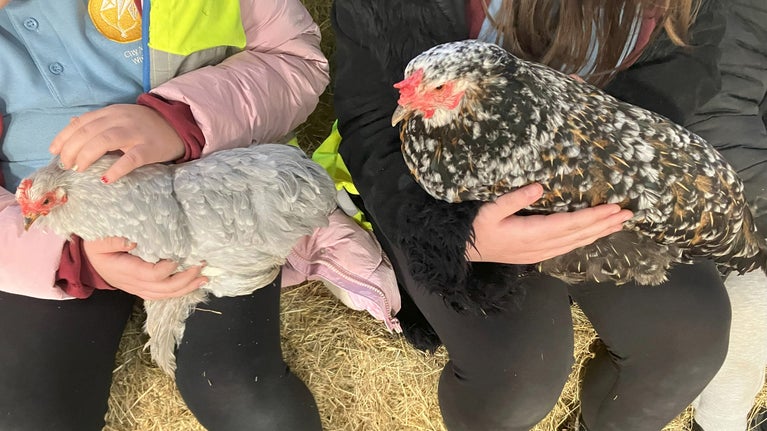
One of the most significant lessons children can take away from a farm visit to the South Downs is the importance of nature preservation. Chalk grassland is a fragile habitat, and much of it has been lost due to farming practices, development, and climate change. However, the South Downs is a region where efforts to protect and restore these precious habitats are ongoing. As children explore this landscape, they can learn about the importance of biodiversity, why certain plants and animals need specific conditions to thrive, and how human activity can help or harm these delicate ecosystems.
Children can also participate in creative activities such as nature crafts, identifying wildlife tracks, and using natural materials to make art.
These hands-on activities not only reinforce the lessons they learn about ecology and farming but also allow children to express their connection to the environment in their own creative ways. Drawing their favourite farm animals, sketching wildflowers, or making leaf collages are simple but powerful ways for children to process what they’ve learned and express their environmental awareness.
As children learn about farming practices, they also discover the importance of supporting local, sustainable agriculture.
‘The children can reconnect with local nature so close to our city – 15 minutes' drive away we have fields! Building a strong connection with a local farm full of heritage - hopefully providing a legacy with our school in the long term’
Sophie, Teacher, St Martins School
The farmers of the South Downs National Park involved in this project are key to making this learning possible. Despite their busy schedules, the farmers have generously shared their time and knowledge, offering children a rare chance to explore working farms and strengthening connections between ‘the towns and downs’. The farmers take the time to explain sustainable practices like crop rotation, animal husbandry, and land management, while also sharing the reasons behind these practices.
I learnt how wheat grows. I also learnt that 1m square of wheat makes 2 loafs of bread. The whole field of wheat can make 68,000 loafs of bread.
Year 4 child, St Martins C of E School visiting Standean Farm
‘One of the experiences that resonates with me was the awe that everyone had when we opened up the grain store door to show the wheat in store after the harvest. This was immediately after they had been in a field learning about the growing cycle of wheat’
Jane, Farmer, Standean Farm
By welcoming questions and engaging in meaningful conversations, farmers provide valuable insights into food production and environmental balance. These hands-on experiences foster respect for the land and encourage children to think critically about farming’s impact on the planet. The success of this project is a testament to the dedication of local farmers who are not only growing food but also nurturing a sense of responsibility and curiosity in the next generation.
‘Do you know, it’s been alright so far, I might actually be a farmer when I’m older’
Year Four girl, Whitehawk Academy visiting Ovingdean Grange Farm
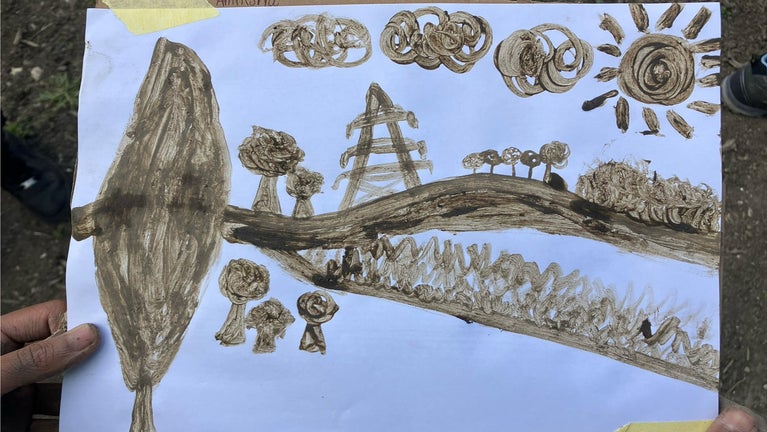

We asked our Community and Participation Apprentice Kitty a few questions about what it is like to be an apprentice with the National Trust, working on the Changing Chalk Project.

Brighton and Hove City Council is the local authority of the city of Brighton and Hove.
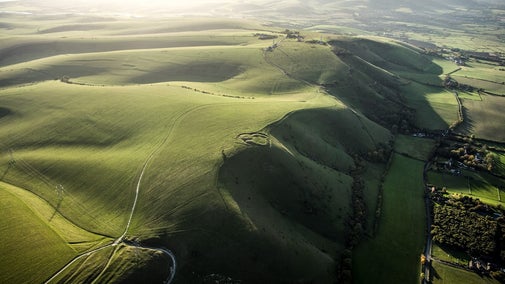
An article looking at where the Changing Chalk project began, and where it is today.

Find out what is involved in a typical day's volunteering with some Changing Chalk projects aiming to protect our chalk grasslands for today and all our tomorrows in the eastern South Downs.

Changing Chalk archaeology apprentice Kayleigh talks about her experiences on our project, Monument Mentors.